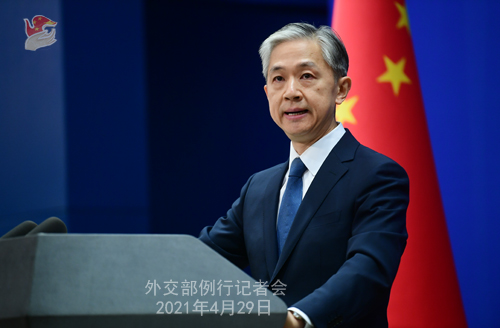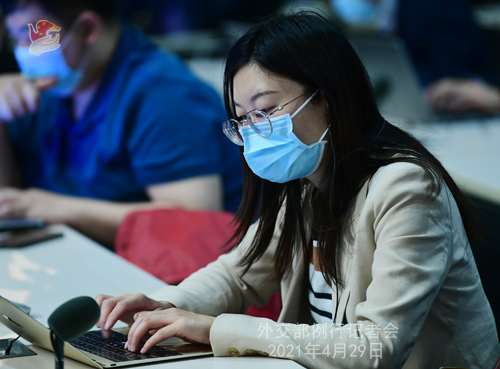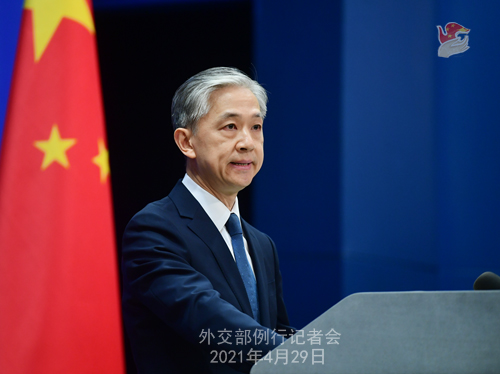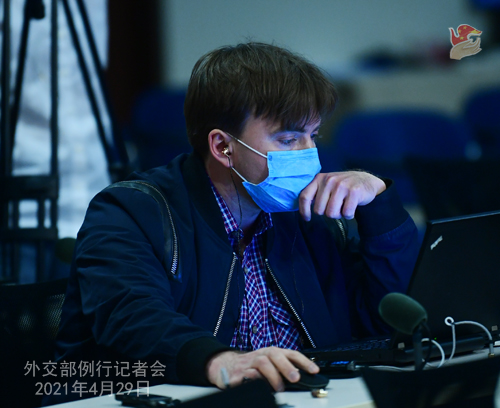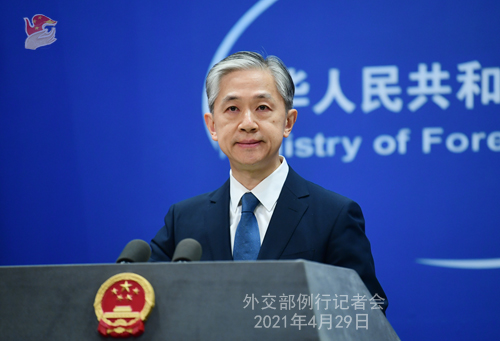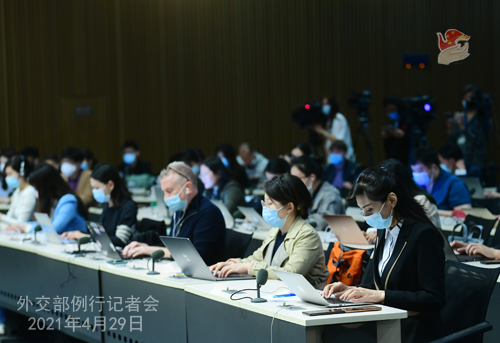| Foreign Ministry Spokesperson Wang Wenbin's Regular Press Conference on April 29, 2021 |
| 2021-04-29 21:28 |
|
AFP: My first question is, US President Joe Biden said in the Address to a Joint Session of Congress that the US is "in a competition with China and other countries to win the 21st Century". He said the US welcomes competition and is not seeking conflict. Do you have any comment? The second question is, President Biden said he told China that the US will maintain a strong military presence in the Indo-Pacific just as it does with NATO in Europe – not to start conflict – but to prevent conflict. What's your response to his remarks? Wang Wenbin: I have also noted relevant reports about President Biden's address. I would like to underscore the following points: First, China follows the path of peaceful development and has been a promoter of world peace, a contributor to global development and a defender of international order. China is committed to developing a relationship featuring non-conflict, non-confrontation, mutual respect and win-win cooperation with the US, and finding a new path of peaceful coexistence and win-win cooperation. That said, China will resolutely safeguard its sovereignty, security and development interests. Second, democracy is the common value of all mankind, not a "patented product" of one single country. The democratic system of a country should and can only be determined by the people of that country in light of its reality. Imposing one's own democratic system on others, or trying to command the world and instigate intolerance in the name of "democracy" is nothing but an insult on and a travesty of democratic values, and will only create division, intensify tension and disrupt stability. Third, cooperation should be upheld as the mainstream of China-US relations. It is natural for the two sides to have competition in some fields, but we should advocate fair competition, like competing with each other for excellence in a racing field, not beating each other on a wrestling arena. The two sides should improve and surpass themselves through the competition, instead of trying to stab each other in the back, or initiating vicious competition and zero-sum game. Fourth, in recent years, the US has repeatedly violated international rules and market principle of fair competition. It has politicized and ideologized economic and scientific issues, abused state power to hamstring the development of China and other countries, and undermined the interests of many, provoking outrage from the international community. The US keeps asking others to play by the rules, but it takes the lead in breaching international rules, a typical behavior of saying one thing and doing another. China minds its own business of improving people's well-being, while some in the US habitually targets China in every utterance out of Cold War mentality, zero-sum mindset and ideological bias, which reveals their lack of self-confidence. Hopefully the US will not let this sour grapes attitude get the better of itself, and look at China's development in a more rational light. If it believes itself to be a major country, it should consider behaving like one. China Review News: According to media reports, on April 27, Japan's cabinet meeting, in response to a written question from House of Representatives member, adopted the view that it is appropriate to use "comfort women" instead of "military-following comfort women", citing concerns over misunderstanding. The Japanese government also adopted an official response that advises against the use of the expression "forced conscription" in reference to Korean victims of Japan's wartime forced labor and recommends simply using "conscription". Japan's Ministry of Education, Culture, Sports, Science and Technology says it believes that the Cabinet decision will be reflected in future textbook screenings.What is China's comment on this? Wang Wenbin: The war of aggression launched by Japanese militarism has inflicted untold sufferings to the people of the vast number of victim countries in Asia, including China. The forced recruitment of "comfort women" is a terrible crime against humanity committed by Japanese militarism. This is an internationally recognized historical fact with solid proof, which can not be denied. The Japanese government tried to play with words to blur the historical facts,understate and evade its historical responsibility. This is another negative move by Japan to deny and distort the history of aggression, which once again highlights Japan's long-standing dishonest attitude towards the history of aggression. The international community need to take strict precautions and put things right. We once again urge the Japanese side to honestly face up to and repent its history of aggression, make a clean break with militarism, properly handle the issue of forced recruitment of "comfort women" and other problems left over from history with a responsible attitude, and take concrete actions to earn the trust of its Asian neighbors and the international community. China News Service: Saudi Arabia's Crown Prince Mohammed bin Salman has lately given an exclusive interview to domestic media, in which he expounded on the vision of Saudi Arabia's foreign policy and stressed that the country is seeking to create new partnerships with China and others. What is China's comment on this? Wang Wenbin: China highly appreciates the positive will of Saudi Arabia to deepen its relations with China. We stand ready to work with Saudi Arabia to elevate our comprehensive strategic partnership to a higher level. We support Saudi Arabia in safeguarding its national sovereignty, security and stability, in following a development path suited to its national conditions, in opposing external interference in its internal affairs, and in playing a greater role in international and regional affairs.
China Daily: The US State Department recently released its 2021 report on Adherence to and Compliance with Arms Control, Nonproliferation, and Disarmament Agreements and Commitments, accusing China of failing to adhere to its nuclear testing moratorium and missile non-proliferation commitment and questioning China's compliance with the Biological Weapons Convention (BWC). Do you have any comment? Wang Wenbin: In recent years, the US has been putting together the so-called annual report on Adherence to and Compliance with Arms Control, Nonproliferation, and Disarmament Agreements and Commitments, making wanton comments on other countries' arms control and non-proliferation policies while exalting its own "exemplary" behavior. It is nothing but a threadbare ploy it uses to deflect international attention and malign other countries. The allegation against China is purely groundless. We firmly reject it. China has been conscientiously fulfilling its international obligations and commitments in a responsible manner. Committed to multilateralism, we actively engage in international cooperation, making significant contribution to upholding the international arms control and non-proliferation regime, world peace and security and global strategic stability. The US, in contrast, guided by the tenet of "America first", has been regressing in the field of arms control and non-proliferation in recent years. It has withdrawn from many treaties and organizations, including the INF Treaty, the Open Skies Treaty and the Arms Trade Treaty. It is the only country to stand in the way of negotiations for a protocol that includes a verification regime to the BWC. It still has not destroyed its chemical weapons stockpile. The US has been pursuing a comprehensive military build-up, deliberating the development of new nuclear warheads, advancing outer space and cyberspace military programs, and seeking unilateral military and strategic advantage at all costs, which seriously disrupt regional and global peace and stability and hamper international arms control and disarmament process. The US makes no mention of its poor record and refuses to reflect on itself, but keeps throwing mud on other countries. It's worth mentioning that the US claims in this report that all its activities are in compliance with the BWC, but when it comes to what happened in Fort Detrick, an issue of serious international concern, it's all hush-hush in the US, and it keeps diverting attention on its many bio-labs overseas. Once again I ask the US to clarify: what activities the US military has conducted in the Fort Detrick base and those bio-labs overseas? Why did it build so many bio-labs all over the world? How can it prove all its activities are in line with the Convention? Actually, once the verification regime is established under the BWC framework, we will be able to see plainly who is in compliance and who is in defiance, and all problems will be solved instantly. However, as I said, the US is the only country opposing negotiation on such a protocol. We reiterate our call for the US to act responsibly, address international concerns, offer clarifications for its bio-military activities at home and abroad, and stop obstructing the establishment of a BWC verification regime.
Global Times: We notice that US officials have accused China of "coercive diplomacy" and "economic and military coercion" on many occasions. What's your response? Wang Wenbin: No one deserves the title of "coercive diplomacy" better than the US, and no one can take this patent away from it. In 1971, Stanford University Professor Alexander George was the first to put forward this concept to summarize the US policy towards Laos, Cuba and Vietnam at that time. The US has shown the world what coercion diplomacy is through its actions in pursuit of its strategic goals by means of military threat, political isolation, economic sanctions and technology blockade. In terms of military threat, the classic examples of "coercive actions" by the US have all led to war, chaos, turbulence and numerous tragedies. The US government does not shy away from using the term "coercive diplomacy". For example, the US forced the military government of Haiti to step down in 1994, and referred to that as "a textbook example of coercive diplomacy". In 2003, it explicitly characterized the $30.3 billion additional military expenses for "coercive diplomacy" as incurred expenses. In terms of political isolation and economic sanctions, the US has been wielding the big stick of sanctions against Cuba, the DPRK, Iran and Venezuela for years. The previous US administration had willfully waged trade wars against many countries. US National Security Advisor Jake Sullivan once wrote that the last US administration's Iran policy "is all coercion and no diplomacy". In terms of technology blockade, the US, in a bid to retain its monopoly in science and technology, abused the concept of national security to wantonly suppress other countries' high-tech enterprises in total disregard of the principles of market competition and international trade rules. Examples like Alstom of France, Toshiba and Toyota of Japan, aerospace industry of the former Soviet Union, and Huawei of China abound. When it comes to China, the US seeks relentlessly to mount pressure on China. It illegally arrests Chinese citizens, suppresses Chinese enterprises for no justifiable reasons, wantonly interferes in China's internal affairs such as Hong Kong and Xinjiang, and coerces other countries into forming an anti-China clique. China is not a perpetrator but rather a victim of "coercive diplomacy", and firmly rejects anyone who engages in such practice. Standing in stark contrast with the "coercive diplomacy" pursued by the US, China is committed to an independent foreign policy of peace. Aggression and hegemony are never in the genes of the Chinese nation. China follows the path of peaceful development and rejects the claim by some that a stronger country is bound to follow the beaten path to seek hegemony. Unlike the US, we have never threatened to use military force against other countries, never engaged in military alliance, and never exported ideology. We have never stirred up trouble on others' doorsteps, or meddled in others' household affairs. We have never taken the initiative to wage a trade war, and never imposed unjustified oppression on foreign enterprises. But when China's national sovereignty and dignity are being coerced and undermined, we undoubtedly need to respond with legitimate and lawful actions to safeguard international equity and justice. Together with all peace-loving countries in the world, we will say no to acts of coercion in whatever form. Shenzhen TV: The government of the Federated States of Micronesia (FSM) said in a press release that President Panuelo wrote a letter to Japanese Prime Minister Yoshihide Suga to express concerns over Japan's decision to release nuclear contaminated water into the Pacific. Does China have a comment? Wang Wenbin: I've also noted this development. President Panuelo stressed in the letter that the FSM's food and financial security is reliant on its maritime and oceanic resources and that the nation's continued survival depends upon environmental protection and sustainable fisheries. He asked Japan to take into account the potential impact its ocean discharge decision might have on countries like the FSM and called on the Japanese government to engage in a formal and multilateral dialogue with countries whose livelihoods depend greatly on the health of the Pacific Ocean. I've also noted that not long ago, the Secretary General of the Pacific Islands Forum released a statement expressing concerns on behalf of leaders of members of the Forum. The ROK, together with eight Central American countries, also issued a joint statement voicing deep concerns over the Japanese decision. All this reflects the high concern of the international community and demonstrates further that the disposal of the nuclear contaminated water from Fukushima is by no means Japan's domestic matter. Once again we urge the Japanese side to earnestly respond to the grave concerns of the international community, voluntarily subject itself to verification and monitoring with substantive international participation, and make sure the disposal issue will be handled with full transparency.
Prasar Bharati: Recently, China's foreign minister Wang Yi said that China is ready to provide support to India in its COVID-19 fight. China's ambassador to India also expressed similar sentiments and said Chinese companies have been guided to fulfill orders from India. At this juncture, Chinese state-owned Sichuan Airlines, which has the largest capacity for cargo shipments to India, has suspended its cargo operations since Monday this week. This has seriously disrupted procurement of oxygen concentrators by Indian businesses. Can you please share some updates as to when Sichuan Airlines will resume its cargo operations to India, in line with announcements made by Chinese government? My second question is, regarding an interview by CEO of US-India Strategic Partnership Forum, China has stopped all the shipments of oxygen concentrators procured by US companies from China to India. Do you have any comment or response to this statement? Wang Wenbin: I'll take your second question first. You said that China has stopped all shipments of oxygen concentrators procured by US companies from China to India. That is fake news. As India battles a rampant new wave of COVID-19, China feels deeply for the Indian people and extend sincere sympathy. We stand ready to provide support and assistance to the Indian people according to their needs. Some Chinese companies have already taken action with support from the government, delivering the first batch of oxygen concentrators to India. We stand ready to continue various forms of anti-virus cooperation with India to help it fight the epidemic. With regard to your question on Sichuan Airlines, as I said earlier, it's a commercial decision and I'll have to refer you to the company. AFP: On April 28, a US State Department spokesperson expressed deep concerns of the amended entry regulations in Hong Kong. Do you have any comment? Wang Wenbin:I noted that the government of the Hong Kong Special Administrative Region has explained relevant regulations. Hong Kong residents' freedom of movement and rights to enter and exit is protected by the Basic Law which allows no denigration. We urge the US side not to interfere in China's internal affairs. CCTV: Yesterday, Premier Li Keqiang co-chaired the sixth China-Germany inter-governmental consultation with German Chancellor Angela Merkel. How does China see the outcomes of the consultation and the positive role of the China-Germany inter-governmental consultation mechanism in the past decade since its founding? Wang Wenbin: Yesterday afternoon, Premier Li Keqiang co-chaired the sixth China-Germany inter-governmental consultation with German Chancellor Angela Merkel. A total of 25 ministers from the two sides took part in the consultation, which is the largest group of participants in recent years. The consultation produced positive results and sent a signal that both sides set great store by the bilateral ties and are committed to taking their cooperation across the board to new levels. I'll refer you to relevant press release, which is now available. The two sides agree that in the past 10 years since the establishment of the mechanism, China-Germany inter-governmental consultations have served as a "super engine" driving China-Germany cooperation. Such a mechanism should be carried on. The two sides agreed to hold a new round of high-level financial dialogue, host a new seminar of the rule of law dialogue in a proper way, and deepen cooperation in such areas as economy and trade, investment, automobile, hi-tech, new energy, digital economy, cultural and people-to-people exchanges to better achieve win-win results. Premier Li Keqiang said that facts show that both China and Germany embrace openness, and upholds fair competition. China will open wider and is ready to share development opportunities with Germany and the rest of the world. Openness should be a two-way process. It is important to promote free trade and world economic recovery through mutual openness. Chancellor Merkel said she welcomes Chinese enterprises to make investment in Germany. It is hoped that the two sides can work together to bring the economic and technological cooperation between the two countries to new heights.
PTI: You mentioned a batch of oxygen concentrators has arrived in India. Can you specify the number of them? How many actually arrived? Are there any more being sent from China in the coming days? Wang Wenbin: Like I just said, China stands ready to provide support and assistance to the Indian people in their anti-epidemic fight in light of their needs. As for the specific number, you may follow updates issued by Chinese embassy and consulates. Beijing Youth Daily: On April 28, Asian Development Bank released the "Asian Development Outlook 2021" report, which projects China's economic growth to surge by 8.1% in 2021. According to another report released yesterday by the United Nations Conference on Trade and Development (UNCTAD), China had the largest share of global exports in goods with 14.7% of the total in 2020. What is China's comment on this? Wang Wenbin: We have taken note of these reports, which we believe reflects the international community's recognition of China's anti-epidemic achievement and the confidence in China's economic growth prospects. Over the past year, China has been coordinating anti-epidemic and development efforts, and was the first major economy to register positive growth. In 2021, China's economy has sustained the sound momentum of steady recovery. The first quarter of this year saw a year-on-year increase of 18.3% in China's GDP and 39.9% in its FDI inflow. In February 2021, the American Chamber of Commerce in South China issued White Paper on the Business Environment in China 2021, which listed China as the most preferred investment destination, saying that 94% of American companies see a bright future in China's market. China's sustained economic growth will give a strong boost to the world economic recovery. In the first quarter of this year, China's FDI outflow reached $31.79 billion, up by 4.6% from the same period last year. The OECD projects China to account for over one-third of world economic growth in 2021. As China speeds up its efforts to build a new development paradigm, it will continue to take an active part in multilateral cooperation in trade and investment, and promote a new system of open economy of higher standards. We welcome all parties getting integrated into the Chinese market to share China's development opportunities. Prasar Bharati: I just want to add something to my second question. CEO of USIPF in the interview said that China has stopped the shipments of oxygen concentrators to India, so it has to reroute to other countries. And it is a lot of time, energy and other things. Can you comment on this? Wang Wenbin: I have already given my response. The allegation of "China stopping all shipments of oxygen concentrators procured by US companies from China to India" is fake news.
|
| |||||||||||||||
|
|||||||||||||||


